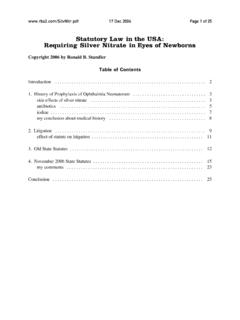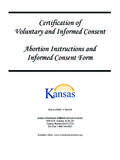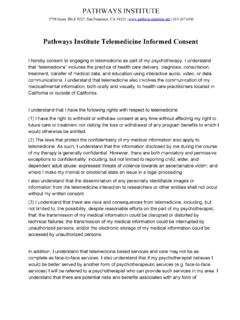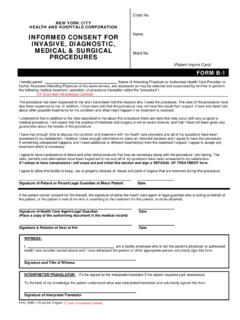Transcription of Legal Right to Refuse Medical Treatment in the USA
1 29 Jul 2012 Page 1 of 57. Legal Right to Refuse Medical Treatment in the USA. Copyright 2012 by Ronald B. Standler No copyright claimed for works of the Government. No copyright claimed for quotations from any source, except for selection of such quotations. Keywords Botsford, cases, compel, decline, Georgetown, Heston, law, Legal , Medical , order, privacy, Refuse , Right , Saikewicz, Schloendorff, transfusion, Treatment Table of Contents Introduction .. 2. Basis for Right to Refuse Treatment .. 3. history .. 3. definition of mentally competent .. 6. common law Right to Refuse Medical Treatment .. 6. no paternalism .. 8. Supreme Court .. 10. emergency exception .. 12. need compelling state interest .. 14. four state interests .. 17. Quinlan .. 17. Saikewicz .. 17. origin of four state interests .. 19. nationwide acceptance .. 20. discussion of four state interests.
2 23. 1. preservation of life .. 23. 2. protection of innocent third parties .. 25. 3. prevention of suicide .. 26. 4. maintaining Medical ethics .. 29. are four interests needed? .. 31. judicial recognition of almost absolute Right .. 32. List of Cases .. 33. State Sometimes Orders Treatment .. 39. 29 Jul 2012 Page 2 of 57. Criticism of Ordering Treatment .. 42. A. criticism of Georgetown .. 42. procedural .. 42. 1. no religious freedom .. 44. 2. no autonomy .. 44. 3. no balancing test .. 44. 4. protection young daughter .. 45. 5. concern for physicians and Hospital .. 45. 6. allegedly incompetent patient .. 46. conclusion about Georgetown .. 47. B. criticism of Heston .. 49. C. mother ordered to have transfusion .. 52. 1. religious freedom .. 52. 2. caring for children .. 52. 3. mischaracterize belief of Jehovah's Witnesses .. 53. 4. deference to physicians.
3 54. Conclusion .. 55. Articles .. 56. Introduction This essay discusses the history of judicial opinions that hold a mentally competent adult patient has the Legal Right in the USA to Refuse continuing Medical Treatment for any reason, even if that refusal will hasten his/her death. The scope of this essay is restricted to mentally competent adults, and includes neither children, insane adults, retarded adults, nor inmates in prisons. This essay specifically does not include parent(s) choosing to decline Medical Treatment for their child. This essay presents general information about an interesting topic in law, but is not Legal advice for your specific problem. See my disclaimer at . I list the cases in chronological order in this essay, so the reader can easily follow the historical development of a national phenomenon. If I were writing a Legal brief, then I would use the conventional citation order given in the Bluebook.
4 29 Jul 2012 Page 3 of 57. Basis for Right to Refuse Treatment history The history of the Right to Refuse Medical Treatment in the USA is often traced back to two judicial opinions: Union Pacific Railway Co. v. Botsford, 141 250, 251 (1891) (Botsford sued railroad for concussion resulting from alleged negligence of railroad. Railroad wanted surgical examination of her injuries. Request of railroad denied. No Right is held more sacred, or is more carefully guarded by the common law, than the Right of every individual to the possession and control of his own person, free from all restraint or interference of others, unless by clear and unquestionable authority of law. );. Schloendorff v. Society of New York Hospital, 105 92, 93 ( 1914) ( Every human being of adult years and sound mind has a Right to determine what shall be done with his own body; and a surgeon who performs an operation without his patient's consent commits an assault, for which he is liable in damages.)
5 In addition to the patient's personal interest in autonomy, self-determination, bodily integrity, freedom from battery, etc.,1 the Right to Refuse Medical Treatment is a corollary to the doctrine of informed consent . Cruzan v. Director, Missouri Dept. of Health, 497 261, 270 (1990) ( The logical corollary of the doctrine of informed consent is that the patient generally possesses the Right not to consent , that is, to Refuse Treatment . );. In re Brown, 478 1033, 1040 (Miss. 1985) ( The informed consent rule rests upon the bedrock of this state's respect for the individual's Right to be free of unwanted bodily intrusions no matter how well intentioned. informed consent further suggest a corollary: the patient must be informed of the nature, means and likely consequences of the proposed Treatment so that he may knowingly' determine what he should do one of his options being rejection.)
6 ;. Cruzan v. Harmon, 760 408, 417 (Mo. 1988) ( The doctrine of informed consent arose in recognition of the value society places on a person's autonomy and as the primary vehicle by which a person can protect the integrity of his body. If one can consent to Treatment , one can also Refuse it. Thus, as a necessary corollary to informed consent , the Right to Refuse Treatment arose. );. Matter of Guardianship of , 482 60, 65 (Wis. 1992) ( The logical corollary of the doctrine of informed consent is the Right not to consent the Right to Refuse Treatment . );. 1 In interests of brevity, I will refer to these values simply as autonomy in this essay. 29 Jul 2012 Page 4 of 57. In re Fiori, 673 905, 910 (Pa. 1996) ( The doctrine of informed consent declares that absent an emergency situation, Medical Treatment may not be imposed without the patient's informed consent .)
7 A logical corollary to this doctrine is the patient's Right , in general, to Refuse Treatment and to withdraw consent to Treatment once begun.' [citations omitted] );. Stouffer v. Reid, 993 104, 109 (Maryl. 2010) ( We explained that the fountainhead of the doctrine [of informed consent ] is the patient's Right to exercise control over his own body, .. by deciding for himself [or herself] whether or not to submit to the particular therapy.'. Mack, .. 618 [744] at 755 (Maryl. 1993) (quoting Sard v. Hardy, .. 379 1014, 1019 (Maryl. 1977)).). The doctrine of informed consent partly comes from the fiduciary duty of the physician to the patient: The relationship between a doctor and his patient is one of trust calling for a recognition by the physician of the ignorance and helplessness of the patient regarding his own physical condition. Canterbury v.
8 Spence, 464 [772] at 781 [( 1972), cert. denied, 409. 1064 (1972)]. The duty of the doctor to inform the patient is a fiduciary duty. [citing two cases] The patient is entitled to rely upon the physician to tell him what he needs to know about the condition of his own body. The patient has the Right to chart his own destiny, and the doctor must supply the patient with the material facts the patient will need in order to intelligently chart that destiny with dignity. Canterbury v. Spence, supra, 464 at 782. Miller v. Kennedy, 522 852, 860 ( 1974), aff'd per curiam, 530 334 (Wash. 1975). Cited in Woolley v. Henderson, 418 1123, 1128, (Me. 1980). See also Lambert v. Park, 597 236, 239, (10thCir. 1979) ( The duty of the doctor to inform the patient is in the nature of a fiduciary duty; thus, the patient has the Right to decide what Medical procedure he will undertake and the doctor must supply the patient with the material facts the patient will need in order intelligently to make that decision.)
9 ;. Nonconsensual surgery is a battery. However, the physician's failure to disclose either (1) a significant risk or (2) the existence of alternative Treatment (s) either one is a lack of informed consent is negligence: Salgo v. Leland Stanford Jr. University Bd. of Trustees, 317. 170, 181 ( 1957) (first reported judicial opinion to use phrase informed consent in Medical context) and Natanson v. Kline, 350 1093 (Kan. 1960). In the later case, the Kansas Supreme Court summarized informed consent to Medical Treatment in a Medical malpractice case: Anglo-American law starts with the premise of thorough-going self determination. It follows that each man is considered to be master of his own body, and he may, if he be of sound mind, expressly prohibit the performance of life-saving surgery, or other Medical Treatment . A doctor might well believe that an operation or form of Treatment is desirable or necessary but the law does not permit him to substitute his own judgment for that of the patient by any form of artifice or deception.
10 Natanson v. Kline, 350 1093, 1104 (Kan. 1960). Quoted in Cruzan v. Director, Missouri Dept. of Health, 497 261, 305 (1990) (Brennan, J., dissenting). 29 Jul 2012 Page 5 of 57. Lawyers did very little with this Legal Right to Refuse Medical Treatment until the 1960s, when (1) lawyers for hospitals began to petition courts to order blood transfusions to save the life of patients who were Jehovah's Witnesses, a sect that refuses blood transfusions, and (2) Medical malpractice cases became common. Beginning in the 1970s, the Right to Refuse Medical Treatment was used to justify disconnecting life support from patients in persistent vegetative states. See the list of cases, beginning at page 33, below. Sadly, there is also a line of cases2 in which judges ordered a blood transfusion or even a cesarean section operation in violation of a mentally competent adult patient's clearly expressed refusal.

















